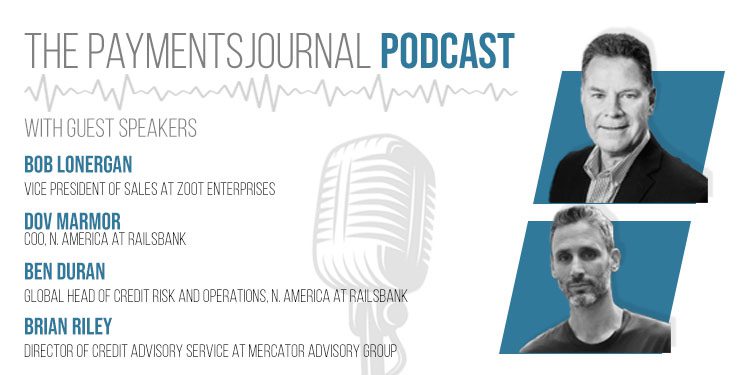Credit is an absolutely massive industry. In 2020, over one-third of all point-of-sale payments in the U.S. were conducted using a credit card. An average U.S. household has at least two credit cards, amounting to over 500 million total cards outstanding in the U.S. Credit cards generate about $4T in spend each year. Most significantly, 85% of that spending is managed exclusively by the top ten credit card issuing banks in the U.S. How can Credit-as-a-service expand the market?
Both as a means to diversify the marketplace and respond to consumer demands, fintechs around the country have begun introducing Credit/Card-as-a-Service (CaaS, or CCaaS), which expands credit offerings and allows credit to be integrated directly into specific businesses. In particular, Railsbank is embedding credit cards directly into the customer experience, bolstered by technology solutions from Zoot.
To learn more about how Railsbank enables any company to become a fintech, and how Zoot ensures responsible lending with rapid technology design and implementation, PaymentsJournal sat down with Dov Marmor, COO, N. America at Railsbank; Ben Duran, Global Head of Credit Risk and Operations, N. America at Railsbank; Bob Lonergan, Vice President of Sales at Zoot Enterprises; and Brian Riley, Director of Credit Advisory Service at Mercator Advisory Group.
Helping companies build their own credit cards
In Marmor’s own words, “Railsbank is a global platform that allows companies to build their own financial products.” These could include payments, debit cards, credit cards, or bank accounts, all of which are built as embedded experiences within the company’s digital app or ecosystem.
“Our platform allows new entrants to come into the market and build their own, what we call, embedded credit card experiences,” explained Marmor. This is distinct from co-brands, which partner with a bank or financial institution – these would be company-specific credit cards, hosted on their digital ecosystem, that allow end users to engage with the brand every day.
This service couldn’t come at a more vital time, as until recently the credit industry has been monopolized by a handful of behemoths. “Any time ten companies own the entire market, there’s a serious lack of innovation within this space,” Marmor pointed out.
Opening up the market to competition allows for a whole new breed of credit cards. For example, a cardholder might be interested in crypto, so their card would allow them to tie every spend to a crypto portfolio investment; similarly, a credit card created by a health and wellness app could set up a cashback rewards system that is activated when the cardholder hits weekly fitness goals on their wearable device. The options are virtually limitless.
How tech partnerships enable rapid deployment of solutions at scale
No single company can achieve the efficiency and effectiveness it needs to succeed without strategic partnerships. For big businesses, shipping, inventory management, payments, and other operations are often conducted through integrations with expert partners. Railsbank is no exception when it comes to bringing their CaaS products to life.
“[Railsbank’s] platform doesn’t need to own every single piece of the ecosystem,” clarified Marmor. “What it needs to do is bring together best-in-breed products from around the ecosystem to create an end-to-end platform, and then operationalize all the processes that make those different systems run in harmony between one another.” This is why Railsbank partnered with Zoot and their Platform-as-a-Service (PaaS) model, according to Duran. “Zoot stands out has having been in this space and had this type of buildout with large and small customers in the past,” said Duran, “and helped us think through what this solution would look like not just in the short term, but also the long term.” Lonergan expanded: “[Zoot’s] been in business for over thirty years… our portfolio of clients run the gamut from Fortune 100 down to innovative disruptors like Railsbank.”
Zoot provides Railsbank with the tools to handle the decision engine themselves. “We control it, we manage it, we build within it, the base structure is there,” Duran continued, also citing Zoot’s private cloud as a key factor in choosing them as a decisioning vendor. “And if at any point we need support or help, it’s just a matter of getting on the phone for thirty minutes.” Zoot and other key partnerships offer Railsbank intuitive programming, reliable API connections, robust data provider networks, and scalability and reusability around the globe.
What comes next for Credit-as-a-Service
The next stages for CaaS are in line with the origins of the service itself – meeting the needs of the market. “We really follow the cues of our customers,” said Marmor. Coming out of a COVID-induced economic slump, and in tandem with soaring housing costs, inflation, and the rise of Buy Now, Pay Later (BNPL), the world clearly is in desperate need of alternative lending methods.
Railsbank is in a unique position to provide those methods – moving from an unsecured consumer credit card to different iterations of credit, and creating easy to launch financial solutions that help companies get off the ground faster. “All of the APIs that face our customers are country agnostic,” Marmor added, “meaning that the same product that you build in the U.S. is built to be transferable to Europe, to Singapore, to Australia, to all the other markets that we open up.”
Ultimately, the proliferation of CaaS and the partnership between Railsbank and Zoot will allow businesses unprecedented customization. “It might be the simple integration with your application that makes things smoother,” said Riley, “or it might be adding features that are really not able to be done in the current environment today.” Either way, the playing field has typically been laid out by the top issuers in the card business, and this sort of disruption by CaaS providers means businesses won’t have to “color within the lines” as much.
“Being able to take that model that Railsbank has and integrate it with expert skills is something that creates a very interesting offer,” Riley concluded.










